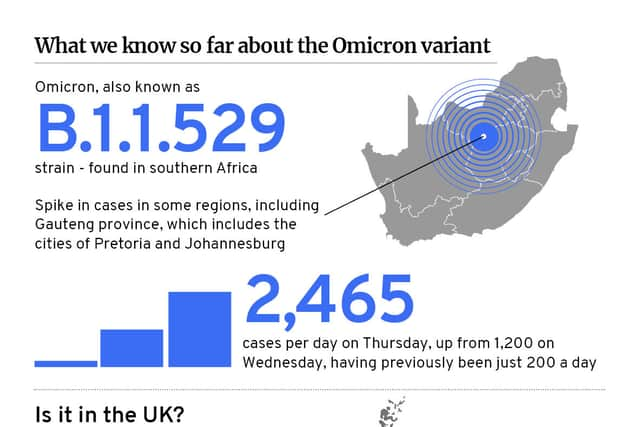Omicron variant: Warnings against socialising as two cases of Covid-19 mutation found in London
and live on Freeview channel 276
Two further cases of the Omicron Covid-19 variant have been found in London, amid advice to limit socialising to prevent the spread of the virus.
Health bosses have confirmed one case has been identified in Camden, north London, and another in Wandsworth, south-west London.
Advertisement
Hide AdAdvertisement
Hide AdThis takes the total confirmed in the UK to 11, with five cases in England and six in Scotland, and comes just days after a case was identified in Westminster, central London.
Loading....
Warnings have followed from Dr Jenny Harries, head of NHS Test and Trace, who told BBC Radio 4 that people can reduce the spread of the variant by limiting their socialising.
She told the Today programme that even if vaccines are effective against the new strain, if Omicron is “more transmissible… [it] could still be a significant impact on our hospitals."
And she said: “Our behaviours in winter and particularly around Christmas we tend to socialise more so I think all of those will need to be taken into account.
Advertisement
Hide AdAdvertisement
Hide Ad"So I think being careful, not socialising when we don’t particularly need to and particularly going and getting those booster jabs which, of course, people will now be able to have at a three-month interval from their primary course."


The UK Health Security Agency (UKHSA) found the first confirmed case of the B.1.1.529 strain in Britain on November 27.
Both latest individuals have links to travel to Southern Africa, and are not connected to each other, or to the previous confirmed cases, and have been told to self-isolate.
Targeted testing is being done in areas where the positive cases were likely to be infectious.
Advertisement
Hide AdAdvertisement
Hide AdDr Harries, who is also chief executive of the UKHSA, said: “It is very likely that we will find more cases over the coming days as we are seeing in other countries globally and as we increase case detection through focused contact tracing.
Loading....
“Vaccination is critical to help us bolster our defences against this new variant – please get your first, second or booster jab without delay.”
Vaccination guidance has changed, with booster doses now recommended for everyone over the age of 18.
Third vaccines will be made available at a minimum of three months after second jabs, and people are advised to book appointments as soon as they are asked to.
Advertisement
Hide AdAdvertisement
Hide AdDr Harries added: “The guidance on vaccination is changing to help all of us bolster our defences in the face of this new variant.
“Please take up this offer as soon as you are eligible to protect yourself, your families and your communities.”
Is Omicron more transmissible?
There were early warnings that the variant could be more transmissible, given how quickly it had spread in South Africa’s Gauteng province - where up to 90% of new cases are already Omicron.
The reason why many scientists believe it can spread faster is that 10 of its 30 or so mutations are on the “spike” protein - the part of the coronavirus that acts a bit like a lock pick, changing shape to allow the virus to latch on to human cells.
Advertisement
Hide AdAdvertisement
Hide AdHowever, the World Health Organization (WHO) has said that it is still too early to know for sure.
“It is not yet clear whether Omicron is more transmissible compared to other variants, including Delta,” they said.
“The number of people testing positive has risen in areas of South Africa affected by this variant, but epidemiologic studies are underway to understand if it is because of Omicron or other factors.”
Does Omicron cause more severe illness?
There are also conflicting reports on the severity of the disease caused by Omicron.
Advertisement
Hide AdAdvertisement
Hide AdDr Angelique Coetzee, the doctor who first spotted the new variant, said that patients have so far had “extremely mild symptoms” - although this may be due to a younger population.
The WHO also says “it is not yet clear” whether Omicron is any more severe, and that increasing hospitalisation rates in South Africa may be due to increasing case rates, rather than the variant itself.
Will the vaccines work against it?
The biggest question is whether Omicron can bypass immunity - whether that’s from the vaccine or previous infection.
Professor Jonathan Van-Tam said that the “number of mutations present, already on first principle, makes us worry about a possible effect on vaccine effectiveness” - although he was quick to stress that that there “are far more things we don’t know yet, than things we do know”.
Advertisement
Hide AdAdvertisement
Hide AdMost scientists are expecting that we’ll have answers about vaccine efficacy against Omicron in two to three weeks - just before Christmas, in other words.
If a new vaccine is required, then all of the major pharmaceutical companies say they can develop tweaked vaccinations for Omicron.
Comment Guidelines
National World encourages reader discussion on our stories. User feedback, insights and back-and-forth exchanges add a rich layer of context to reporting. Please review our Community Guidelines before commenting.
